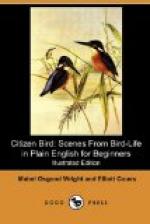CHAPTER XXVII
THREE FAMOUS GAME BIRDS
“If any one should ask you which are the most famous American game birds, you may answer without hesitation, ’Bob White, Ruffed Grouse, and Woodcock’—the whistler, the drummer, and the sky dancer—all three good Citizens and handsome, interesting birds.
“Bob White is the most familiar, because in spring, when he feels quite sure that the law will protect his pretty head, he comes out of the thick bushes to the rail fence by the roadside and calls his own name—’Bob—white, bob—white!’—so that the shy mate he desires shall know where to find him. Then if she is hard-hearted and a long time coming he will say—’Bob-white, poor bob-white!’ as if craving for pity.
“The last of May the nesting begins, and from then until autumn Bob White tells his name and whereabouts to no one; for it is a very busy season with him. The nest of leaves on the ground may yield during the summer twenty or thirty little Bobs, whom he must help supply with food and teach to walk about and care for themselves.
“In autumn each one of these Quail families—for Mr. Bob White is a kind of Quail—is called a ‘covey.’ They take to thick brush for winter food and shelter, being very clever at hiding from the sportsman, and only flying from shelter when nosed out by his dog.
[Illustration: Bob White.]
“The Ruffed Grouse is also a bird of woods and brushy places, but at all seasons is more fond of trees than Bob White. It is much larger than Bob, and if seen among the underbrush looks like a small, brown, speckled Hen. Watch one in the spring-time, when he is roaming the woods in search of a mate, and you will see that he is every inch a game bird—a king of game birds too. In early May this Grouse mounts a fallen tree, or the rail of an old fence, and swells his breast proudly till the long feathers on each side of his neck rise into a beautiful shining black ruffle or tippet, such as you can see in some old-fashioned portraits of the times when Elizabeth was queen of England. He droops his wings and spreads his tail to a brown and gray banded fan, which he holds straight up as a Turkey does his when he is strutting and gobbling. Next he raises his wings and begins to beat the air—slowly at first, and then faster and faster. ’Boom—boom—boom’—the hollow sound comes rolling with a noise like beating a bass drum.
“Thus does the Ruffed Grouse drum up his mate, as the Woodpecker hammers or the Thrush sings. You remember the booming sound made by the wings of the Nighthawk, when the air whizzed through them? When Bob White and his Grouse brother fly, their wings make a whirring noise that is equally startling.”
“And does his mate understand that the drumming is meant to call her?”
“Yes, surely; and soon there is a nest of dry leaves somewhere about the roots of a tree, or under a fallen log. Father Grouse then becomes selfish and takes himself off with some men friends, leaving mamma alone to hatch the eggs and feed the babies. But this is not so dreadful as it seems, because the young ones are fully covered with down like Chickens when they first leave the egg, and able to follow their mother; besides, they are the most obedient little things imaginable.




